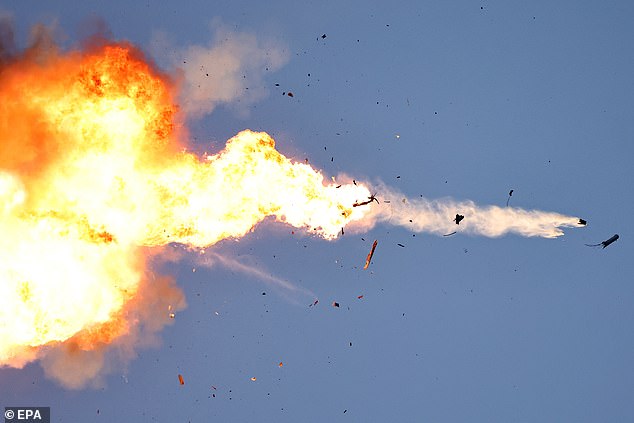The storm of missiles, rockets and drones launched from Lebanon towards Israel in the early hours of yesterday may have been nothing more than a preliminary.
This bombardment could have been worse had it not been for a series of earlier Israeli airstrikes designed to forestall Hezbollah’s plans to launch an even larger wave of rockets.
The Israeli air force attacked thousands of rocket launchers and bunkers housing everything from old Soviet Katyusha systems to modern Iranian missiles.
Many of the missiles fired from Lebanon can cause serious damage if they hit a target, but are “mostly” easy for Israeli air defenses to detect and destroy.
This Hezbollah drone was shot down by an Israeli plane
However, this latest attack serves to further weaken Israel’s defensive capabilities, particularly the Iron Dome system, thereby improving Hezbollah’s chances of hitting important targets with more powerful missiles in the future.
Islamist militants say they have damaged buildings inside Israel, as far south as the outskirts of Tel Aviv, and hit a military base and a patrol boat further north.
We cannot be sure of this: Israel has banned the publication of photographs of bomb damage, both on television and on social media, to prevent Hezbollah from making a damage assessment.
A state of emergency has also been declared.
Whatever the case, the Hezbollah attack had been expected for weeks, in revenge for Israel’s double assassination of one of its commanders and Hamas leader Ismail Haniyeh, who was killed in the Iranian capital Tehran last month. The revenge attack was delayed because of the Shiite holy holiday of Arbaeen, when up to two million pilgrims travelled by land from Lebanon and Iran to Karbala in Iraq.

Many observers believe that Israeli Prime Minister Benjamin Netanyahu is relying on a constant state of conflict to stay in power.
Now that his trip is over, the head of Iran’s Revolutionary Guard – Hezbollah’s real masters – has warned that the war is about to begin in earnest.
Israel is well prepared, but its preemptive strikes yesterday may not be enough to deflect the onslaught. Hezbollah is estimated to have some 150,000 rockets in its well-hidden arsenals. This escalation also looks set to end US efforts to broker a ceasefire agreement between Israel and Hamas in Gaza. Critical to this is the release of the surviving hostages captured during the Hamas attack on October 7.
Both sides say they do not want all-out war, but neither is willing to be the first to turn the other cheek and stop retaliating, so war is looming. If it happens, it will be on a scale that will dwarf the incalculable civilian cost of Israel’s assault on Gaza over the past ten months.
Many observers believe that Israeli Prime Minister Benjamin Netanyahu is relying on a constant state of conflict to stay in power.
As long as there is no ceasefire in Gaza, Israeli politics will remain in a tense truce. If the fighting stops, Netanyahu will be ousted by his rivals and face trial and possibly prison on corruption charges.
The United States has pledged to support Israel in any war against Iran. It has already deployed large naval forces, including three nuclear-powered aircraft carriers, to the seas of the Middle East.
Thanks to our military bases in Cyprus, just over 100 miles from the nearest missile launchers in Lebanon, the UK would also be drawn into the war. Not only our armed forces, but also expatriates and tourists in Cyprus would be at risk.
Last Friday, Hamas announced that Israelis in Europe and elsewhere, and by extension all Jews, were now considered targets for terrorist attacks abroad.
Meanwhile, schools in northern Israel are closed and up to 100,000 Israelis have been evacuated from the border with Lebanon.
Threats to peace continue to loom beyond Israel and Lebanon, and fears are growing that the vortex of escalating violence could drag us and many others into conflict.
- Mark Almond is a director from the Crisis Research Institute In Oxford


